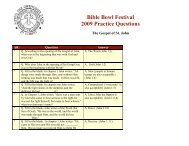Mark 9 - Orthodox Christian Bible Studies
Mark 9 - Orthodox Christian Bible Studies
Mark 9 - Orthodox Christian Bible Studies
Create successful ePaper yourself
Turn your PDF publications into a flip-book with our unique Google optimized e-Paper software.
mation of all creation. Archbishop Dmitri Royster explains:“In the dazzling light, in which the very mountain and allthe surroundings were altered, there is a glimpse of thetransfigured world (cosmos), when God will be all in all,when the Kingdom is finally established.”MARK 9:14-32Jesus again confronted a lack of faith among Hisfollowers. His Disciples were unable to exorcise a demonfrom a young man, and even the boy’s father —who brought his son to Jesus — doubted whether Jesushad the ability to exorcise the demon. Jesus lamentstheir faithlessness (vs. 19), comments that all things arepossible to those who believe (vs. 23), and yet againexperienced faithlessness in His Disciples when they stillrefused to accept that Jesus would die and rise again. Allof these things point to the need to cry out with the fatherof the demonized boy, “Lord, I believe; help my unbelief”(vs. 24)!MARK 9:33-50The <strong>Orthodox</strong> Study <strong>Bible</strong> titles the last third of thischapter “The Way of Discipleship” because in it Jesusdescribed some of the attributes needed in a wholeheartedfollower of Christ.Jesus first taught the Disciples that they must avoidpride and greed in their lives. Rather than fulfilling theircalling as disciples so that they couldreceive status and recognition fortheir accomplishments, <strong>Christian</strong>sshould be like youngchildren: innocent and unconcernedwith things likestatus (vv. 33-37, 42). TheShepherd of Hermas explains:“Thy are as veritableinfants, whose heartsdo not invent evil, whohardly know what corruptionis, and who haveremained childlikeforever. People suchas these, therefore,undoubtedly dwell inthe kingdom of God,OUR FAITH TEACHESDo <strong>Orthodox</strong> <strong>Christian</strong>s believe that people willforever be tormented in literal, physical fire and brimstone?There are certainly some <strong>Christian</strong>s who believethat those who reject God will spend eternity burningin a fiery hell. Traditionally, however, the <strong>Orthodox</strong>Church teaches a different understanding of the fireand torment.St. John of Damascus writes, “Sinners will be givenover to everlasting fire, which will not be a material firesuch as we are accustomed to, but a fire such as Godmight know.” St. John’s teaching can be better understoodby looking at two biblical references to fire andlight in relation to God. Holy Scripture describes God’spresence as a “consuming fire” (Hebrews 12:29) andan “unapproachable light” (1 Timothy 6:16) that delightsthose who love Him, but causes anguish and pain inthose who do not “love His appearing” (2 Timothy 4:8).Therefore, for those who love God, resurrection fromthe dead and the presence of God will be paradise. Forthose who hate God, however, resurrection from thedead and the presence of God will be hell.because they in no way defile God’s commandments.”Jesus next confronted the danger of sectarianism (asect is a group that separates itself from all others, oftenviewing itself as good and all others as evil) when HisDisciples were concerned that individuals who were notdirectly following Jesus were nonetheless able to exorcisedemons in His name (which, ironically, the Disciplesthemselves had just been unable to do). Jesus simplyresponded, “He who is not against us in on our side” (vs.42).Jesus went on to explain that <strong>Christian</strong>s should leaveand avoid anything that tempts us to sin (vv. 43-48). Hedid not mean to literally dismember ourselves: instead,he used such shocking imagery to reinforce how thoroughlywe should refuse to let anything come betweenGod and us. He already said that <strong>Christian</strong>s should notvalue their lives more than Him (see 8:35-36); later inthis Gospel He will similarly warn that we should not loveour possessions (10:21), or even our family (10:28), morethan we love God.WHAT DID I LEARN ABOUT FOLLOWING JESUS?• St. Luke adds a detail regarding Jesus’ activity when the Transfigurationoccurred. Do I follow His example?• Do I pray the same thing as the father in verse 24: “Lord, Ibelieve; help my unbelief?” What do I believe, and where do I need to grow?• Am I concerned with status and power, or is my relationship with God likethe children He praised in vv. 33-37?• Are there things in my life that I need to “amputate” to draw closer to God?
















